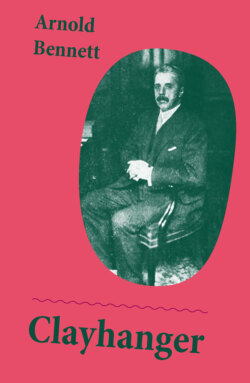Читать книгу Clayhanger (Unabridged) - Arnold Bennett - Страница 59
На сайте Литреса книга снята с продажи.
Three.
ОглавлениеHe heard the door being pushed open, and he gave a jump and turned his head. His father stood in the entrance to the attic.
“Hello, father!” he said weakly, ingratiatingly.
“What art doing at this time o’ night, lad?” Darius Clayhanger demanded.
Strange to say, the autocrat was not angered by the remarkable sight in front of him. Edwin knew that his father would probably come home from Manchester on the mail train, which would stop to set down a passenger at Shawport by suitable arrangement. And he had expected that his father would go to bed, as usual on such evenings, after having eaten the supper left for him in the sitting-room. His father’s bedroom was next door to the sitting-room. Save for Mrs Nixon in a distant nook, Edwin had the attic floor to himself. He ought to have been as safe from intrusion there as in the farthest capital of Europe. His father did not climb the attic stairs once in six months. So that he had regarded himself as secure. Still, he must have positively forgotten the very existence of his father; he must have been ‘lost,’ otherwise he could not but have heard the footsteps on the stairs.
“I was just drawing,” said Edwin, with a little more confidence.
He looked at his father and saw an old man, a man who for him had always been old, generally harsh, often truculent, and seldom indulgent. He saw an ugly, undistinguished, and somewhat vulgar man (far less dignified, for instance, than Big James); a man who had his way by force and scarcely ever by argument; a man whose arguments for or against a given course were simply pitiable, if not despicable. He sometimes indeed thought that there must be a peculiar twist in his father’s brain which prevented him from appreciating an adverse point in a debate; he had ceased to expect that his father would listen to reason. Latterly he was always surprised when, as to-night, he caught a glance of mild benevolence on that face; yet he would never fail to respond to such a mood eagerly, without resentment. It might be said that he regarded his father as he regarded the weather, fatalistically. No more than against the weather would he have dreamed of bearing malice against his father, even had such a plan not been unwise and dangerous. He was convinced that his father’s interest in him was about the same as the sun’s interest in him. His father was nearly always wrapped in business affairs, and seemed to come to the trifling affairs of Edwin with difficulty, as out of an absorbing engrossment.
Assuredly he would have been amazed to know that his father had been thinking of him all the afternoon and evening. But it was so. Darius Clayhanger had been nervous as to the manner in which the boy would acquit himself in the bit of business which had been confided to him. It was the boy’s first bit of business. Straightforward as it was, the boy might muddle it, might omit a portion of it, might say the wrong thing, might forget. Darius hoped for the best, but he was afraid. He saw in his son an amiable irresponsible fool. He compared Edwin at sixteen with himself at the same age. Edwin had never had a care, never suffered a privation, never been forced to think for himself. (Darius might more justly have put it—never been allowed to think for himself.) Edwin had lived in cotton-wool, and knew less of the world than his father had known at half his years; much less. Darius was sure that Edwin had never even come near suspecting the miracles which his father had accomplished: this was true, and not merely was Edwin stupendously ignorant, and even pettily scornful, of realities, but he was ignorant of his own ignorance. Education! ... Darius snorted. To Darius it seemed that Edwin’s education was like lying down in an orchard in lovely summer and having ripe fruit dropped into your mouth... A cocky infant! A girl! And yet there was something about Edwin that his father admired, even respected and envied ... an occasional gesture, an attitude in walking, an intonation, a smile. Edwin, his own son, had a personal distinction that he himself could never compass. Edwin talked more correctly than his father. He thought differently from his father. He had an original grace. In the essence of his being he was superior to both his father and his sisters. Sometimes when his father saw him walking along the street, or coming into a room, or uttering some simple phrase, or shrugging his shoulders, Darius was aware of a faint thrill. Pride? Perhaps; but he would never have admitted it. An agreeable perplexity rather—a state of being puzzled how he, so common, had begotten a creature so subtly aristocratic ... aristocratic was the word. And Edwin seemed so young, fragile, innocent, and defenceless!
